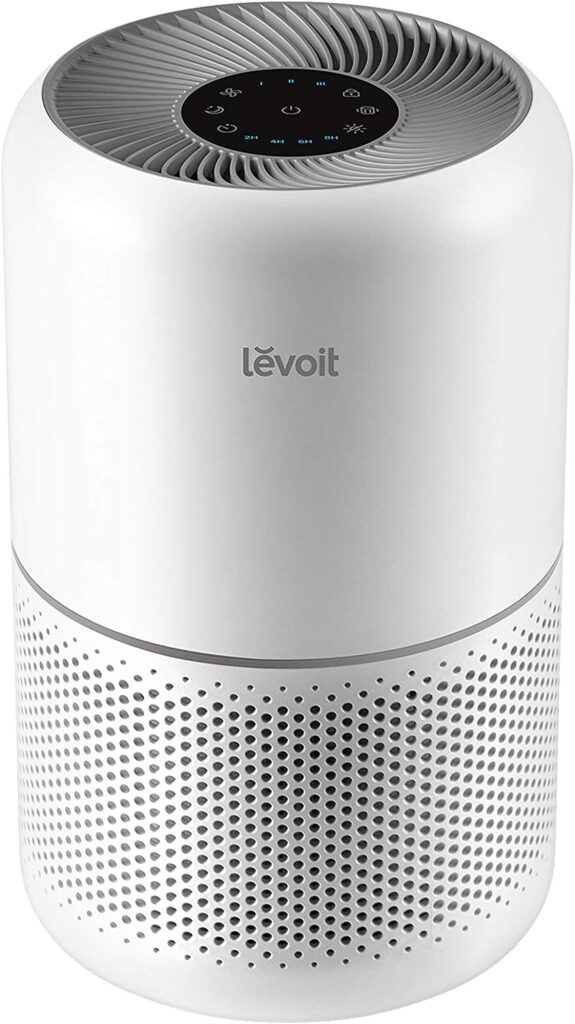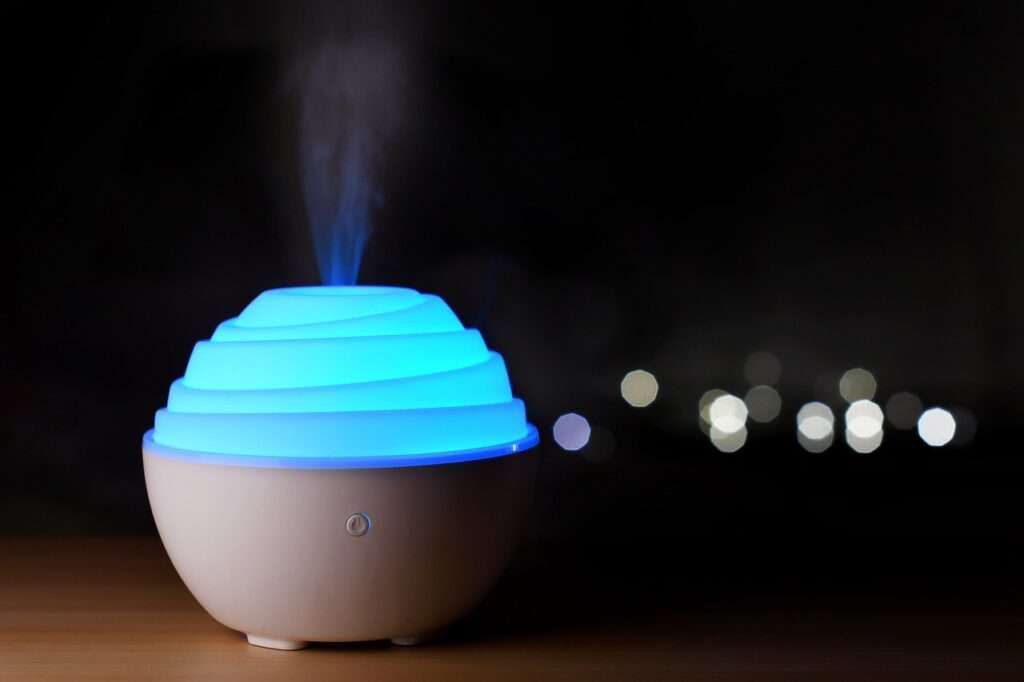Are you seeking fresh air in your home or want to renew your air and invigorate your senses?
You are in the right place.
You may need an air purifier or a diffuser.
So get ready to witness a showdown of epic proportions: air purifier vs diffuser.
These two powerful machines are ready to duke it out for the ultimate air quality champion title.
If you stick around long enough, you’ll get to find out the ultimate weapon in your fight against asthma and allergies.
We’ll also look at the pros and cons of each device and help you decide on the best one for your home.
So let’s start.
Air Purifier vs Diffuser: Mode of Operation
To better understand these devices, you need to know how they work.
Air Purifier

An air purifier works by cleaning the air in a room. It removes harmful particles such as dust, pollen, and pet dander.
It pulls air into the unit and channels it across a series of filters that capture these particles.
The best type of air purifiers are the ones with a HEPA filter. This is because HEPA filters can capture particles as small as 0.3 microns.
Once the air has been purified, clean air is released back into the room.
But some air purifiers use more than just a HEPA filter to purify the air.
Some come with more features, such as UV-C lights. This can be important if you need to kill bacteria and viruses.
Most units also have activated carbon filters to remove odors from the air in your room.
Diffuser

On the contrary, a diffuser is engineered to disperse essential oils into the air.
It adds a few drops of essential oil to water, which is then turned into a fine mist and released into the air.
The mist not only dissipates the scent of the essential oil but can also add moisture to the air in your home.
This can help to relieve dry skin, congestion, and other respiratory issues.
There are a variety of diffusers you can find. They include ultrasonic, nebulizing, and heat diffusers.
Difference Between Air Purifier and Diffuser
Air purifiers and diffusers are two devices that can improve the air quality in your home.
However, they work in different ways and have distinct purposes.
The primary purpose of an air purifier is to remove harmful pollutants and improve air quality.
It limits exposure to chemicals, allergens, and other triggers that can cause a flare-up.
If you must keep your symptoms at bay, you may need an air purifier. You need to include it in your asthma or allergy plan.
But a diffuser does not filter particles from the air. Instead, it disperses essential oils, adding fragrance to the air in your home.
Essential oils are extracts from plants with a variety of health benefits. They can help ease stress and anxiety, improve sleep, and boost mood.
Here is a table summarizing the differences between air purifiers and diffusers:
| Features | Air Purifier | Diffuser |
|---|---|---|
| Function | Cleans the air by removing allergens and pollutants | Releases aromatic scents into the air |
| Benefits | Improves air quality by removing allergens, dust, and other pollutants | Promotes relaxation and helps to relieve stress |
| Filters | Equipped with HEPA filters that trap pollutants and allergens | Does not have filters |
| Maintenance | Requires regular filter replacements | No filters to replace, but needs regular cleaning |
| Ideal for | People with allergies or respiratory issues | People looking for aromatherapy benefits |
| Noise Levels | Can be noisy | Generally quiet |
| Power | Usually requires electricity | Can be battery-operated |
| Cost | Can be expensive | Can be affordable |
Similarities Between an Air Purifier and an Aroma Diffuser
Both air purifiers and aroma diffusers can enhance the quality of the air you breathe. But while they differ in functions, they share some similarities.
Firstly, both devices are easy to use. Air purifiers have a simple on/off switch or a few buttons to adjust the settings.
Aroma diffusers are also easy to use, requiring only water and a few drops of essential oil.
In addition, both devices come in various sizes and styles to fit your needs.
You can get small desktop models and larger units for whole-house air purification.
Same in oil diffusers…
They also come in various sizes, from small portable devices to larger units that you can use in an entire room.
Finally, if you have respiratory problems, you may benefit from both gadgets.
As already stated, air purifiers can help get rid of specific airborne triggers in your room.
Aroma diffusers can release essential oils like eucalyptus or peppermint, easing your symptoms.
Pros And Cons of Air Purifiers
Here are some advantages and disadvantages of air purifiers to consider:
Pros.
- Improved Air Quality.
- Reduce the severity of allergic symptoms like sneezing, coughing, and itchy eyes.
- Air purifiers can help eliminate unpleasant odors from your home.
- Air purifiers can help improve your sleep quality by removing airborne irritants.
Cons.
- Some air purifiers can be expensive to buy and maintain. But there are more affordable options.
- Some air purifiers can be noisy.
- Air purifiers use electricity, adding to your energy bill over time.
Pros And Cons of Diffusers
Using diffusers is a popular method to relish the benefits of essential oils. Here are some pros and cons to help you decide if a diffuser suits you.
Pros.
- Diffusers release aromatic scents into the air. They can have a calming or energizing effect on your mood.
- Some aromatic oils, like tea tree oil, have antimicrobial effects that can help kill airborne germs.
- Diffusers are simple to use and operate.
Cons.
- Some people may be allergic to certain essential oils.
- Not as effective as air purifiers in improving air quality.
- Diffusers need regular cleaning to prevent mold and bacteria buildup.
Air Purifier vs Diffuser for Allergies
The key to managing your allergies is reducing your exposure to environmental triggers.
And the best tool to achieve this is an air purifier.
When you use an air purifier with a true HEPA filter, you can remove 99.9% of particles as small as 0.3 microns.
And this includes things like pollen, dust, pet dander, and some bacteria and viruses.
This can help relieve symptoms like sneezing, coughing, congestion, and more…
But a diffuser might be a good option if you want a device to help you relax and unwind.
It emits tiny droplets of oil into the air, creating a relaxing or refreshing ambiance in your room.
Fortunately…
You can also use diffusers to help ease specific allergy symptoms. Some essential oils can help reduce inflammation and congestion in the airways.
For example…
Using lavender oil may aid in reducing stress levels and encourage relaxation. Also, peppermint oil may help clear sinuses and improve breathing.
You may need to check with a specialist as some people are allergic to certain aromatic oils.
Furthermore…
If you want to keep your symptoms on a leash, you may need an air purifier, dehumidifier, or both.
So you should read my blog post on Air purifiers vs dehumidifiers. It’ll help you make the right choice for your allergies.
Humidity also plays a vital part in the air quality of your home. Depending on your needs, you might need to choose between a humidifier and an air purifier.
My article on humidifiers vs air purifiers covers everything you need to know.
Verdict | Which is better diffuser or an air purifier?
The answer to this depends on your needs or priorities.
For instance…
If you aim to improve your room’s air quality, an air purifier is the way to go.
They can be pretty handy for people with allergies or respiratory problems.
On the other hand, if you want to add a pleasant scent to your home, a diffuser is the better choice.
You can use diffusers with essential oils to create a relaxing and calming atmosphere. They can also help to enhance your mood and relieve stress.
The good news is that…
Some air purifiers also come with a diffuser function, allowing you to enjoy the benefits of both devices in one.
But these combos are more expensive than standalone air purifiers or diffusers.
So you may need to weigh your needs and budget to make the right decision.
Air Purifier vs Diffuser: Frequently Asked Questions
Can a diffuser be used as a purifier?
No, a diffuser cannot be used as an air purifier. A diffuser has no filter to remove these particles, so it cannot purify the air. Its diffuser releases aromatic scents into the air.
Can you put oils in an air purifier?
No, you should not put oils in an air purifier. Air purifiers clean the air by filtering pollutants and allergens, not releasing scents.
Adding oils to an air purifier can damage the machine and reduce effectiveness.
Moreover, oils can clog the filter, making it less efficient in cleaning the air. But some modern air purifiers have a diffuser function, so you can put oils.
Is an air purifier the same as a diffuser?
No, an air purifier is not the same as a diffuser. While both machines can improve indoor air quality, they have a unique purpose.
An air purifier can help those with allergies or respiratory problems. But a diffuser is used for relaxation or creating a pleasant atmosphere.